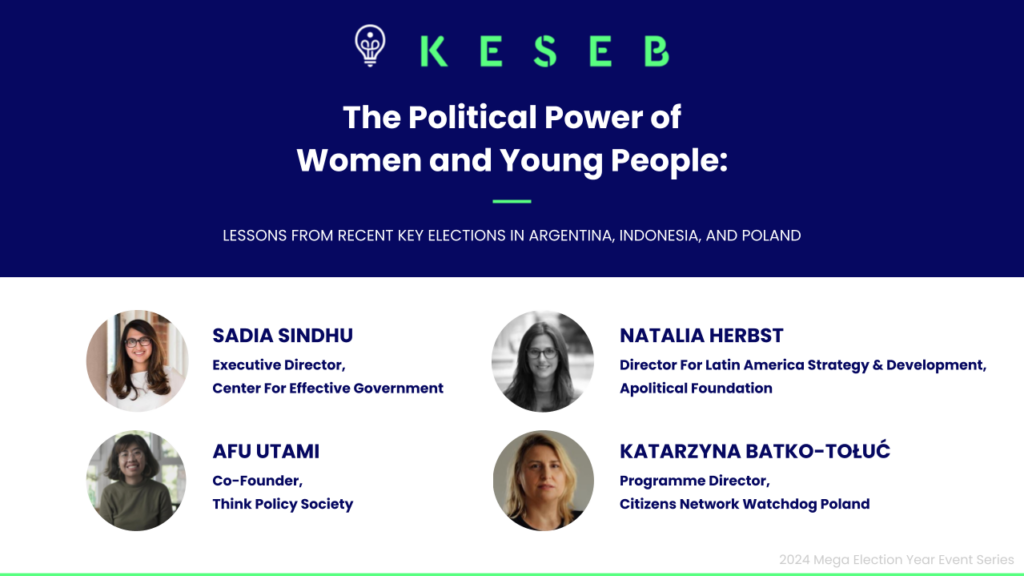
April 11, 2024 | As the global community witnesses an unprecedented number of elections this year in countries representing more than 4 Billion people , Keseb is hosting a series of virtual events to exchange ideas, tactics and foster solidarity across borders.
On March 28th, we organized a panel discussion to understand how women and young people have played a critical role in key recent elections in Argentina, Indonesia, and Poland. The purpose of this dialogue was to unpack lessons and tactics to inform preparations for upcoming elections. The conversation is available to watch on Keseb’s YouTube channel.
The discussion featured: Sadia Sindhu, Moderator (United States), Executive Director, Center for Effective Government; Natalia Herbst (Argentina), Director for Latin America Strategy and Development, Apolitical Foundation; Afu Utami (Indonesia), Co-Founder, Think Policy Society; and Katarina (Kasia) Batko-Toluć (Poland), Programme Director, Citizens Network Watchdog Poland.
CONTEXT ON THE ELECTION OUTCOMES
Argentina, Indonesia, and Poland recently had consequential elections in which women and young people played a pivotal role.
🇦🇷 Argentina: In November 2023, Javier Milei, a self described “political anarchist” and “anarcho-capitalist” won the Presidential election promising a new era of economic policies. Milei’s rhetoric and policies mirror those of the United States’ Donald Trump and Brazil’s Jair Bolsonaro. Former President Donald Trump has shown solidarity with Milei, referring to his campaign as “Make Argentina Great Again,” a pun on Trump’s MAGA slogan. Post-election analyses show that Milei was propelled to victory by three primary factors: (1) a predominantly male youth movement that expanded to include all age groups; (2) frustrations with Argentina’s high inflation, with a peak at 211% in 2023; and (3) an alliance with the traditional right. Latest analysis shows that male voters between 18 and 25 are more conservative than any other age group and are showing the largest ideological gap between men and women. This group that holds socially and economically conservative views is poised to shape future elections, as early voting experiences have been known to forge one’s electoral identity.
🇮🇩 Indonesia: In February 2024, Prabowo Subianto, a controversial former army general and Defense Minister won the Presidential election securing ~58% of the vote. Indonesia, the largest Muslim democracy in the world, also has a majority young population, with Gen-Zers and Millennials accounting for ~60% of the electorate, translating to ~114 million people. Prabowo’s win has been attributed to (1) his successful ability to recast his image from a military strongman to a “cute grandfather” using traditional and social media (2) the appeal of Subianto’s new image with young voters, many of whom were born after the military dictatorship era, and (3) the endorsement from the outgoing President Joko Widodo, known as Jokowi.
🇵🇱 Poland: In October 2023, Poland ushered in a new political era, defeating the conservative Law and Justice (PiS) party after eight years in power. The election which witnessed a historic voter turnout of nearly 75% (the largest since the fall of communism in 1989), is seen as a much needed source of inspiration for pro-democracy champions in an embattled global landscape. The success of the opposition to PiS is largely attributed to (1) an effective mobilization of women and young people and (2) the creation of a diverse political pro-democracy coalition that brought together the political left, center and right. Despite PiS’ significant advantages in the media and entrenched societal influence, Poland demonstrated that victory is not only probable but possible.

KEY TAKEAWAYS FROM THE PANEL DISCUSSION
1. Young people voted for change – illiberal (Argentina) and liberal (Poland). They vastly rejected the status quo and embraced dramatic change in their political systems. In 2015, Poland’s Law and Justice political party appealed to young people through a conservative and traditionalist platform. This changed in 2023, with young people seeking a different reality, a more “European identity.” In Argentina, young people, angered by the lack of economic stability as well as some socially conservative ideals, rejected mainstream political leadership and opted for a self-proclaimed “political anarchist.”
💡 WHY THIS MATTERS: It is faulty to assume that young people have an inherent bias for pro-democratic candidates or a more “progressive” agenda. Argentina and Poland show that they are willing to take political risks to experiment with new leadership, motivated by change on the issues they care about from economic concerns to human rights values. Poland’s Law and Justice party failed to understand its changing electorate whereas Argentina’s Milei captured the zeitgeist.
2. Coordinated and effective civil society mobilization efforts played a momentous role in driving a historic voter turnout, delivering a pro-democracy win in Poland. A post-election poll revealed that “over 50% of respondents” in Poland had been exposed to messaging by civil society. In a country with a historic low voter turnout, civil society messaging campaigns played a crucial role in activating people through a combination of online and offline strategies.
💡 WHY THIS MATTERS: Narrative building should not be exclusively relegated to political parties and candidates. Civil society, often through grassroots organizing/mobilizing, is best positioned to reach people through credible and proximate messengers.
3. With the ever growing competition for attention, pop culture fueled and savvy social media messaging seems to be potent in shaping voters’ perceptions. With a significant proportion of new voters in Indonesia consuming their information on TiktoK, the flooding of social media with catchy music and messaging by Probowo’s campaign captured young voters’ imagination and attention. This approach thwarted even unprecedented campaign strategies such as an opposition candidate’s effort to host town halls to be more accessible to voters.
💡 WHY THIS MATTERS: Substantive policy platforms should be packaged through compelling and trendy strategic communications campaigns. Probowo’s messaging tactics demonstrated the sheer power of efficacious marketing by building a highly orchestrated brand, including by using popular “Pixar” like cartoon images of Prabowo that resonated with younger populations.
4. Young women are not single-issue voters but seem to be more progressive on social issues than young men. Abortion rights played an important role in mobilizing women of all ages in Poland against the Law and Justice party. In Argentina, there was a significant gap between young men and women in their support for Milei’s conservative platform. In Indonesia, young people, including women, span the ideological spectrum on various issues, breaking down the myth of the “progressive youth.”
💡 WHY THIS MATTERS: With early voting behavior shaping future political engagement, young women will continue to serve as bulwarks of pro-democracy and human rights movements globally. However, they should not be taken for granted as young women are also impacted by a range of other policies, including economics. It should not be assumed that women voters will consistently prioritize “women’s” issues in lieu of other priorities.
5. Community organizing should maintain strong momentum through 100-days post-election, setting the stage for the next cycle. Since assuming office, Milei has struggled to fill key positions in his administration and to implement policies. As a result, surveys show dissatisfaction and increased levels of distrust in government, creating opportunities for the opposition. Meanwhile, Poland’s civic coalition is facing its biggest battle to remain united in governance and in upcoming local elections.
💡 WHY THIS MATTERS: Funders should support civil society groups to maintain organizing efforts beyond the election date to:
- Ensure pro-democracy coalitions/candidates continue to receive political cover and support.
- Alternatively, if in opposition to the elected government, as Argentina demonstrates, an activated civil society can use this period to convert disenchanted voters and start to build a bigger base for the next election.
In the wake of these three pivotal elections, it is evident that the collective voice and power of young people and women is shaping and reshaping electoral outcomes and the global political landscape more broadly. Democracy champions and civil society organizations should continue to adapt innovative strategies to foster inclusive and proactive engagement, informed by the diversity and evolving priorities of young people and women in their respective contexts.
Witten by Yordanos Eyoel

